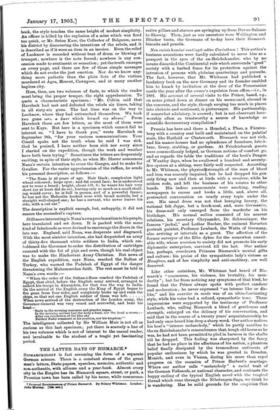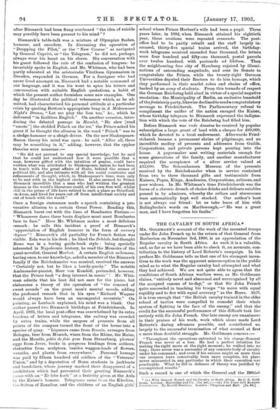THE LATTER DAYS OF BISMARCK.*
BIBMABCKOLOGY is fast assuming the form of a separate German science. There is a constant stream of the great man's letters, State-papers, speeches, memoirs, authentic and non-authentic, with albums and a year-book. Almost every city in the Empire has its Bismarck square, street, or park, a Prussian town has been called by his name, while commemo- • Personal Reminiscencss of Prince Biansarck. By Sidney Whitman. London : John Murray. [12a. net.1 rative pillars and statues are springing up from Dar-es-Salaam. to Sleswig. Then, just as our ancestors wore Wellington and Bliicher boots. the Germans of to-day have their Bismarck biscuits and pencils.
Non cuivis homini contingit adire Corinthutn ! This author's business avocations were hardly calculated to serve him as a passport in the eyes of the ex-Reichskanzler, who by no means discarded the Continental rule which surrounds "good" society with a barbed fence for its protection against the- intrusion of persons with plebeian quarterings and pursuits. The fact, however, that Mr. Whitman had published a laudatory book on the new Germany and its founder enabled him to knock by invitation at the door of the Pomeranian castle the year after the owner's expulsion from office,—i.e., in 1891. His account of several visits to the Prince, based, e.g., on notes jotted down at dinner on his menu-card, abound in the concrete, and the style, though surging too much in places into rhetoric and sentiment, is picturesque. His partisanship, if somewhat adulatory, is avowed ; but is not observant hero- worship often as trustworthy a source of knowledge as scientific documentary compilation P Prussia has here and there a Henckel, a Pleas, a Ffirsten- berg with a country seat built and maintained on the palatial scale, like Hatfield or Chatsworth. Bismarck was not rich, and his manor-houses had no splendours of furniture, bric-it- brae, livery, stabling, or gardens. At Friedriohsruh guests were commodiously lodged, as German notions of comfort go, and as regards the table the traditions of the host's Dragon of Wantley days, when be swallowed a hundred and seventy- five oysters at a sitting, were fairly well respected. According to Mr. Whitman, the physicalj strength of the man of blood and iron was scarcely impaired, but he had dropped his gun only firing now and then at birds with a revolver, while he seldom rode, and left the business of his estates to other hands. His indoor amusements were smoking, reading newspapers to excess and books a little, and, above all, protracted conversation on nearly every topic under the. sun. His usual dress was not that lounging luxury, the national felt loppe, but a frock-coat, and, more Germanic°, his dress-suit only emerged from the wardrobe on his birthdays. His normal milieu consisted of his nearest relations, his secretary Chrysander, Dr. Schweninger, the famous "jackal," and Lothar Bucher, the eminent Bavarian portrait painter, Professor Lenbach, the Watts of Germany, also arriving at intervals as a guest. The affection of the former surveyor of the Elbe dykes for the somewhat unsuit- able wife, whose aversion to society did not promote his early diplomatic enterprises, survived till the last. Our author has, perhaps, overdrawn Princess Bismarck's mental gifts and culture : his praise of the sympathetic lady's virtues as Hausfrau, and of her simplicity and anti-snobbery, are well deserved.
Like other outsiders, Mr. Whitman had heard of Bis- marck's "coarseness, his violence, his brutality, his men- dacity"; but far from noticing any symptoms of that kind, he- found that the Prince always spoke with perfect candour and moderation ; he never expressed "an intense like or dis- like," and his suaviter in mock was of an ultra-fascinating style, while his voice had a refined, sympathetic tone. These impressions were supported by the testimony of Professor Lenbach, who, calling Bismarck a blend of gentleness and strength, enlarged on the delicacy of his conversation, and said that in the course of a twenty years' acquaintanceship he- had only once heard him drop a sharp word. Our author notices his host's "intense melancholy," which he partly ascribes to the ex-Reichskanzler's remembrance that, tough old horse as he was, be had not been permitted to plod in harness in the shafts till he dropped. This feeling was sharpened by the fancy that he had no place in the affections of his nation, a phantom belief finally dissipated by the tremendous outbursts of' popular enthusiasm by which he was greeted in Dresden, Munich, and even in Vienna, during his more than royal progress on the occasion of Prince Herbert's marriage. Where our author calls " melancholy " a racial trait of the German Volkeseele, or national character, and contrasts the happy ending of the typical English novel with the tragical thread which runs through the Nibelungen-Saga, we think he is wandering. Has he solid grounds for the suspicion that
after Bismarck had been flung overboard "the idea of suicide may possibly have been present to his mind" Bismarck's table-talk was a mixture of Olympian flashes, humour, and anecdote. In discussing the operation of "Dropping the Pilot," or the "New Course" as navigated by General Caprivi, or "the Telegram," he did not, perhaps, always wear his heart on his sleeve. His conversation with his guest followed the rule of the confusion of tongues : he invariably spoke in English, and Mr. Whitman, who had been partly educated at the aristocratic Titzthum Gymnasium in Dresden, responded in German. For a foreigner who had never lived amongst us, Bismarck had a notable command of our language, and it was his wont to spice his letters and conversation with suitable English quotations, a habit of which the present author furnishes some new examples. One day he illustrated the political vehemence which, as he ad- mitted, had characterised his personal attitude at a particular
crisis by quoting Bottom's appropriate brag in A Midsummer Night's Dream, "Let me play the lion too," &c., which he
delivered "in faultless English." On another occasion, intro- ducing the debated passage in Hamlet, "He slew [read "smote] the sledded Polack on the ice," the Prince asked his guest if he thought the allusion in the word " Polack " was to a sledge-hammer or a sleigh-driver. On the new Shakespeare- Bacon theory his mind was open : he said, "After all, there may be something in it," adding, however, that the cypher theories were nonsense :— " He did not pretend to any special knowledge, but he said that he could not understand how it were possible that a man, however gifted with the intuition of genius, could have written what was attributed to Shakespeare, unless he had been in touch with the great affairs of State, behind the scenes of political life, and also intimate with all the social courtesies and refinements of thought, which, in Shakespeare's time, were only to be met with in the highest circles. It also seemed to Prince Bismarck incredible that a man who had written the greatest dramas in the world's literature could, of his own free will, whilst still in the prime of life have retired to such a place as Stratford- an-Avon, and lived for years out off from intellectual society and out of touch with the world."
Once a foreign statesman made a speech containing a pro- vocative allusion to a certain Great Power. Reading this, Bismarck burst out with the lines of Bombastes Furioso :— "Whosoever dares these boots displace must meet Bombastes face to face." Here Mr. Whitman makes a most delicious remark : he calls this incident a proof of Bismarck's appreciation of English humour in the form of nursery rhymes"! Bismarck's old partiality for French fiction was visible. Zola was in his desk ; he liked the Debacle, but thought Rome was in a boring guide-book style : being specially interested in Napoleonic history, he read the Memoirs of the quasi-novelist, General Marbot. A certain English melomane, having once, to our knowledge, asked a member of the Bismarck family if the Reichskanzler was musical, received the answer, "Certainly not, but he likes a hurdy-gurdy." The notable Ambassador-pianist, Herr von Kendell, pretended, however, that the Prince took "a deep interest in music " ! Mr. Whit- man admits that his host did not care for the piano, but elaborates a theory of the operation of "the concord of sweet sounds" on the great man's mental moods, adding the profound remark that in his eyes "Richard Wagner would always have been an uncongenial eccentric." On painting, as Lenbach explained, his mind was a blank. Our author passed two Bismarck birthdays at Friedricharuh. In April, 1893, the local post-office was overwhelmed by its extra burdens of letters and telegrams, the railway was crowded by extra trains, while the cargoes of presents from all points of the compass turned the front of the house into a, species of quay. "Liqueurs came from Russia, sausages from Bologna, beer from Munich, wines from the Rhine, the Maine, and the Moselle, pates de foie gras from Strassburg, plovers' eggs from Jever, books in gorgeous bindings from authors, statuettes from sculptors, besides waggon-loads of flowers, wreaths, and plants from everywhere." Personal homage was paid by fifteen hundred old soldiers of the "Veterans' Union," and by a deputation of Bonn students in jackboots and bandoliers, whose journey marked their disapproval of a prohibition which had prevented their greeting Bismarck's uame with an "Er lebe hoch " at a festivity given at the Aula in the Kaiser's honour. Telegrams came from the Khedive, the Sultan of Zanzibar, and the children of an English girls' school where Prince Herbert's wife had been a pupil. Three years later, in 1892, when Bismarck attained his eightieth year, these ovations, were repeated crescendo. The post- office had to be partly rebuilt and the staff largely in- creased, thirty-five special trains arrived, the birthday- week telegrams received exceeded four thousand, the letters were four hundred and fifty-one thousand, postal parcels over twelve hundred, with postcards ad libitum. Then the neighbouring free city of Hamburg rejoiced by illumi- nations of astounding magnitude, and sent its Senate to congratulate the Prince, while the twenty-eight German Universities deputed their Rectors to do him homage, which they performed in their scarlet robes and chains of office, backed by an army of students. From this tornado of respect the German Reichstag held aloof in virtue of a special negative resolution : the Municipality of Berlin, an exclusive leasehold of thefreisinnig party, likewise declined to send a congratulatory message to Friedrichsruh. The Parliamentary refusal to compliment the unifier of the nation enraged the Kaiser, whose birthday telegram to Bismarck expressed the indigna- tion with which the vote of the Reichstag had filled him.
Before Bismarck was rude donatus he received by popular subscription a large grant of land with a cheque for 260,000, which he devoted to a local endowment. Afterwards Fried- richsruh became a permanent shrine of pilgrimage, and an incredible medley of presents and addresses from Guilds, Corporations, and private persons kept pouring into the house. A papermaker sent writing materials enough for some generations of the family, and another manufacturer required the acceptance of a silver service valued at 212,000. The Schoenhausen Museum of the presents received by the Reichskanzler when in service contained from two to three thousand gifts and testimonials from Kaisers, Popes, Kings, Academies, Corporations, artisans, and poor widows. In Mr. Whitman's time Friedrichsruh was the focus of a chronic drench of choice drinks and delicate eatables poured in by admirers, whereby the cellars and storerooms were automatically kept well stocked. Our author's host is not always our friend : let us take leave of him with Bolingbroke's words on Marlborough,—" He was a great man, and I have forgotten his faults."











































 Previous page
Previous page